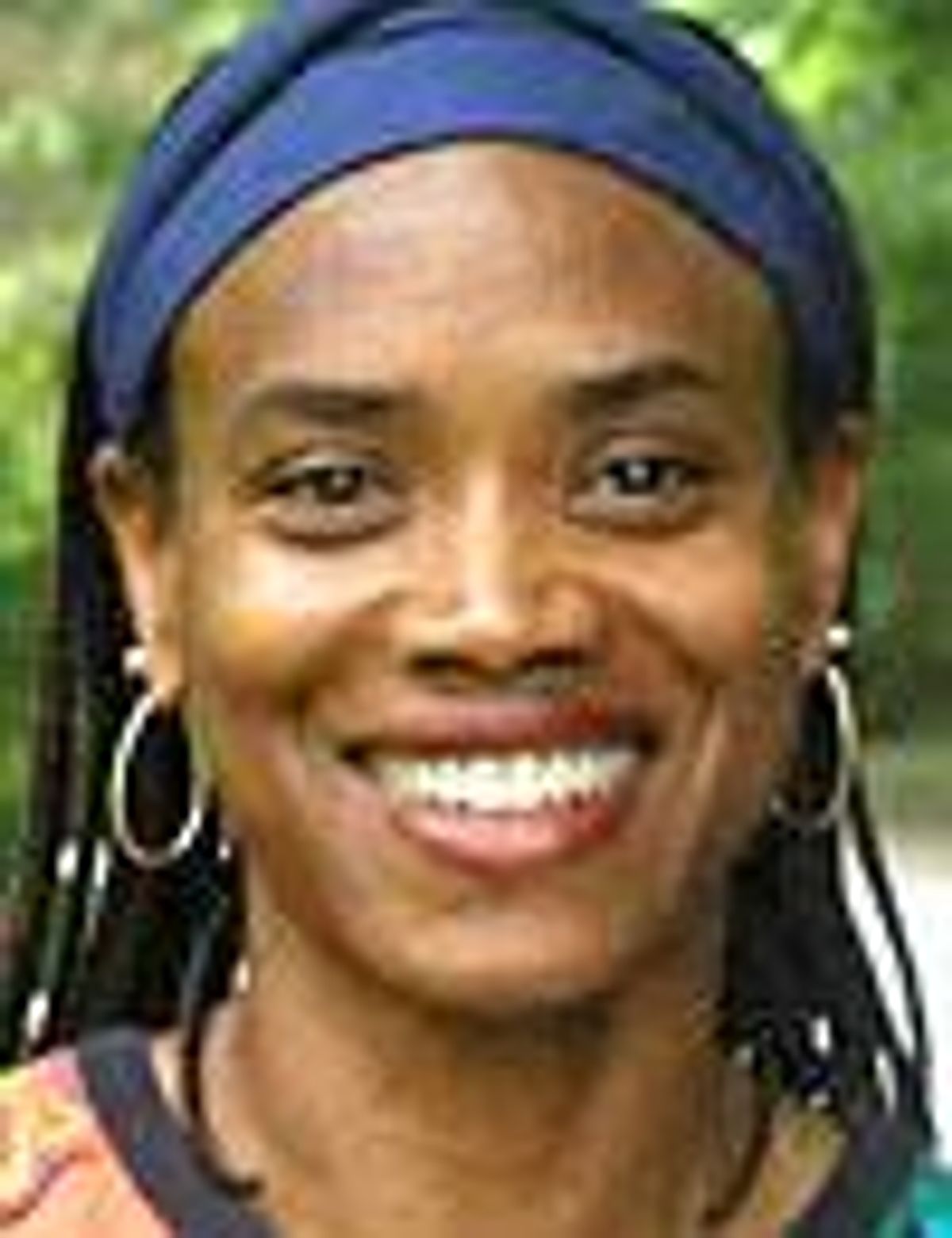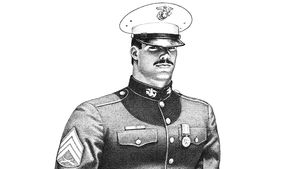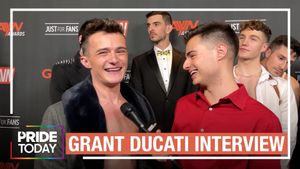In looking back
over the past year of major events and issues confronting
the lives of African-American lesbian, gay, bisexual,
transgender, and queer people, I realize that we have
accomplished quite a lot.
In crossing over
into 2006, while standing on the shoulders of our LGBTQ
foremothers and forefathers, here's a glimpse back at
our creative genius and collective strength that got
us through the raging culture wars of 2005.
We built an African-American civil rights
organization. In coming up with the idea of
building an organization that addresses the social
justice issues of African-American LGBTQ people, cofounder
and president Keith Boykin created the National Black
Justice Coalition in 2003. As a civil rights
organization of black LGBTQ people and our allies, the NBJC
is dedicated to fostering equality by fighting racism and
homophobia. The group advocates for social justice by
educating and mobilizing opinion leaders, including
elected officials, clergy, and media, with a focus on
African-American communities.
In October 2005,
the NBJC became official when the organization was
approved for 501(c)(3) status. And in November,
NYANSAPO, the magazine of the NBJC, premiered.
The magazine is a first-time comprehensive look at how
African-American LGBTQ people live out the
intersectionality of their multiple identities.
We stood in need
of prayer. On the church front, our community heard the
usual cacophonies of hollering homophobes confusing hallowed
homilies with hate-filled messages. The shock and awe,
however, came from our allies.
In July,
prominent African-American minister Willie F. Wilson, pastor
of Union Temple Baptist Church in Washington, D.C.,
who in 1999 opened his church for a forum on
discrimination against same-gender loving people, set
off a firestorm with his now-notorious sermon denouncing
gays and lesbians.
Using graphic
language, Wilson told an approving audience:
"lesbianism is about to take over our
community. Women falling down on another woman,
strapping yourself up with something, it ain't real.
That thing ain't got no feeling in it. It
ain't natural. Anytime somebody got to slap some
grease on your behind and stick something in you,
it's something wrong with that. Your butt
ain't made for that. No wonder your behind is
bleeding. You can't make no connection with a screw
and another screw. The Bible says God made them male
and female."
In August, the
well-loved and lauded liberal African-American pastor Dr.
Jeremiah Wright of Trinity United Church of Christ in
Chicago, who has a same-gender loving ministry in the
church, wrote in the church's magazine,
Trumpet, his real views about this segment of his
congregation, causing many parishioners to leave the church.
In his article
"Maybe I Missed Something!" many of us who
admire him got to see how our issues are not a
priority in his present-day prophetic social gospel
intended to ameliorate the social conditions of all
God's African-American children. "While
our denomination grappled with how to address that
human problem, the denomination also, at that Synod, voted
to ordain a homosexual. Guess which item made the
newspapers? Maybe I missed something!" And in
his closing tirades on SGL issues, Wright stated this:
"Are 44 million Americans with no health care
insurance less important than 'gay
marriage'? Why aren't Black Christians in an
uproar about that? Maybe I am missing
something!"
When the article
came out in light of the United Church of Christ's
stance on ordaining and marrying SGL people, it was
disheartening for many of us to know that Reverend
Wright broke rank with his liberal denomination to
stand in solidarity with a more conservative Black Church
position.
We campaigned against homophobia. While our
connections and contributions to the larger black
religious cosmos are desecrated every time homophobic
pronouncements go unchecked in these holy places of
worship, there are, unbeknownst to many, African-American
ministers who support the ethos and expression of our
spirituality. These ministers understand that in
standing within the Black Church tradition of a
prophetic social gospel, one can be unabashedly Christian,
unapologetically black, and also uncompromisingly
SGL-friendly.
In August, Dr.
James A. Forbes Jr., senior minister at the Riverside
Church in New York City, held a conference to address
antigay rhetoric spewing from pulpits in conservative
churches.
The Reverend Al
Sharpton, along with his National Action Network, has
become a leader in the fight to stamp out homophobia in the
Black Church. Why the personal stake in the issue? His
sister is a lesbian. In the October 11 issue of The
Advocate Sharpton stated, "I understood the
pain of having to lead a double life in the system [since]
we grew up in the church."
And while
misogynistic and homophobic lyrics are a mainstay in hip-hop
music, hip-hop artist Kanye West is on a campaign against
homophobia by challenging his fellow rappers to eschew
those rhymes. During an interview for an MTV special,
West disclosed that he changed his views when he found
out his cousin is gay. "It was kind of like a turning
point when I was like, 'Yo, this is my cousin.
I love him and I've been discriminating against
gays.' "
We tied the knot.
Today the topic of marriage equality is still debated,
with many African-American ministers leading the campaign
against it. And ironically, many in the
African-American LGBTQ community are not too wedded to
the idea, either.
With continued
silence and no action from the communities on the topic of
same-sex marriage, the issue nonetheless will not be
disappearing anytime soon.
Social research,
moreover, shows that African-American same-gender
households have everything to gain in the struggle for
marriage equality and more to lose when states pass
amendments banning marriage equality and other forms
of partner recognition.
In November,
Equality Maryland and the NBJC published "Jumping the
Broom: A Black Perspective on Same-Gender
Marriage." The publication was produced to
initiate dialogue in churches, fraternal organizations,
media outlets, and NAACP chapters.
Statistics reveal
that 45% of black same-sex couples report stable
relationships of five years or longer. These are
relationships that are nevertheless routinely denied
the tax breaks, health benefits, and decision-making
rights that straight married couples enjoy. This is not a
religious issue: Even if marriage becomes a legal option,
clergy will decide whom they wish to marry.
We made a million more steps for an inclusive march.
To commemorate the 10th anniversary of the historic
October 1995 Million Man March, the Minister Louis
Farrakhan announced on May 2 plans for the October
2005 Millions More Movement March.
Not surprising,
however, Farrakhan's invitation to an
"all-inclusive" and broad coalition of
African-American civil rights leaders and organization
once again excluded LGBTQ activists and organizations.
After promising
that there would be an LGBTQ speaker at the event, Keith
Boykin was dropped on the day of the event, but Cleo Manago,
founder of Black Men's Xchange, an Afrocentric
support system for the empowerment of black men of
diverse sexualities, was not. Why? Manago mirrors the
fundamental sentiment of Farrakhan's
theology--a conscious separation from the
dominant white heterosexual and queer cultures.
We had our say. Best sellers in the writers'
corner came in the form of books discussing the topic
of African-American men "on the down
low." J.L. King became the issue's poster boy
by exposing the behavior in his 2004 best seller On
the Down Low: A Journey Into the Lives of
"Straight" Black Men Who Sleep With Men.
Keith
Boykin's 2005 best seller, Beyond the Down Low:
Sex, Lies, and Denial in Black America,
dispelled the hype that men on the DL are the root
cause of the AIDS epidemic by exposing how the Black Church
and its sexual politics contribute to this subculture.
"Ex-gay" activist and minister K. Godfrey
Easter depicts his recent and dramatic transformation
from being gay to now being straight in his memoir
Love Lifted Me Because of the Church: Why One Can NOT
Be Gay and Christian. When asked what brought
about the turnaround, Easter replied, "God did
it! All I can say is that inside me, the instant love
cataclysmically collided with wisdom, a great separation
took place--me from homosexuality."
And the
best-selling author of How Stella Got Her Groove
Back, Terry McMillan, is "waiting to
exhale" from the news that her husband,
Jonathan Plummer, who inspired the blockbuster hit of the
same title, is gay.
We had our coming-out moments. Three-time WNBA MVP
and Olympic gold medalist Sheryl Swoopes came out in
an interview with ESPN The Magazine.
And after a
dearth of black actors in Queer as Folk, Queer Eye for
the Straight Guy, and The L Word, a
deluge of applause was heard throughout the
nation's LGBTQ community when the black cast of
Noah's Arc premiered on Logo, a gay
and lesbian cable channel.
We gave final farewells. The African-American
community lost a great hero with Rosa Parks, the
mother of the 1960s civil rights movement, leaving us
in October. And when we lost R&B crooner Luther
Vandross, the queries about his orientation surfaced yet
again. Vandross finally came out shortly before his
death, setting the record straight. He was
"bi"--not sexually but coastally. He had
homes in both California and New York.


















































































